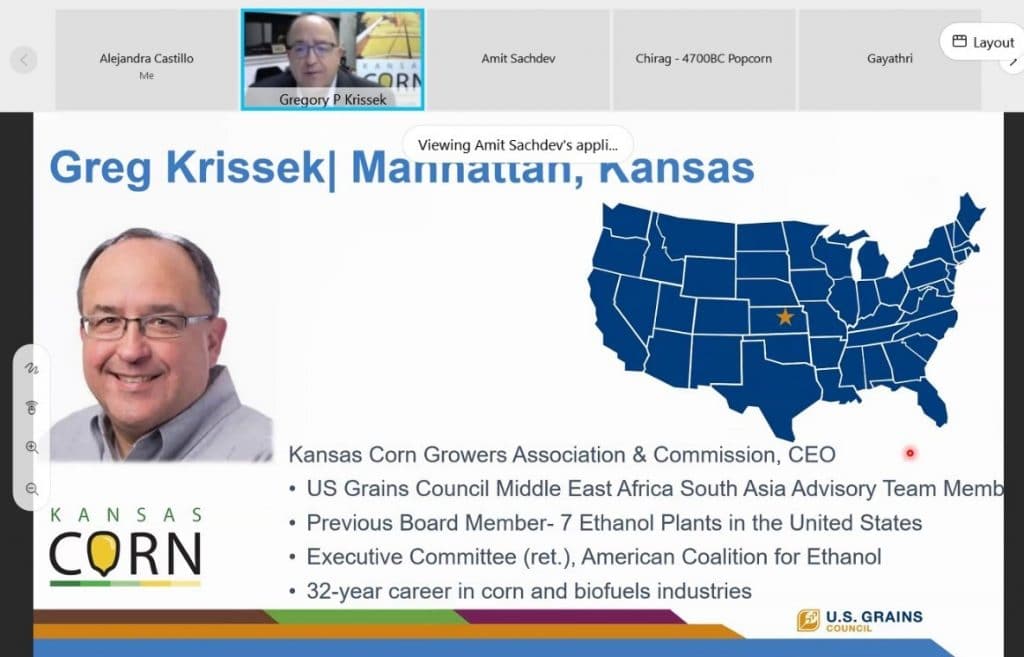The U.S. Grains Council (USGC) recently participated in the biannual Federation of Indian Chambers of Commerce and Industry (FICCI) Maize Summit, at which both Amit Sachdev, USGC representative in India, and Kansas Corn Commission Executive Director Greg Krissek spoke about the potential for corn in India.
While Sachdev weighed in on production, supply and demand of Indian and U.S. corn, Krissek told the story of how U.S. producers have used technology to boost production and then diversify uses for corn while serving the domestic industry and creating value-added products for domestic and international markets. Both mentioned that India could do the same and not only increase its access to feed for livestock, but also meet its environmental goals by using corn for manufacturing ethanol.
“India wants to double its supply of corn, and this was a first opportunity to demonstrate U.S. corn industry best practices that India could model to fit its own need,” said Alejandra Danielson Castillo, USGC director for South Asia.
Having a broader conversation during this event about the types of technology that boosted U.S. corn yield and production allowed the Council to illustrate how the U.S. ethanol industry grew and how practices like precision agriculture, crop protection and soil management could help India meet its dual goals of feeding its population and addressing its environmental concerns.
“We were able to connect the use of technology in our farming practices as the source of the increase in U.S. production and how this increase translated to a robust domestic market that gave birth to the ethanol industry, which is now helping to supply the world,” Danielson Castillo said.
Krissek has been personally involved in the Council’s India outreach, including attending the Society of Indian Auto Manufacturers’ Indian Auto Show in 2020. There, he met with government and private sector officials to talk about ethanol, which led to an invitation to the FICCI event.
During the Summit, held April 16, Krissek showed how the U.S. has increased and maximized corn production without jeopardizing the poultry and starch industries, a concern for government and industry professionals in India. He also demonstrated how a thriving ethanol industry creates more value-added products like distiller’s dried grains with solubles (DDGS) that can sustain India’s livestock.
“I was honored to speak about the corn supply and demand experience in the United States over these past 10 to 12 years, in which our farmers responded to market growth using technology improvements in sustainable ways to more than adequately supply our customer needs in the livestock and biofuels sectors,” Krissek said. “Farmers want to produce their crop and will respond with great gusto when the private sector demand signals and government public policy are clear and motivating.”
Because of low yields and other geographical constraints, India lacks availability of nutritious feed for its livestock sector, so considering genetically modified (GM) crops as a feed supplement for livestock could provide a solution. However, GM cotton is the only crop developed with biotechnology currently approved by the Indian government for use in the market.
“We have an opportunity here,” Danielson Castillo said. “At a time when India continues to struggle to meet its goals of being self-sustainable and its other climate commitments, investing in this sector is important. And it does not mean harming the domestic industry, but rather allowing domestic access to better tools so they can become competitive in the international market.
“This fits into the Council’s strategy in India as it is very important to highlight that everything is connected. Investing in technology – be it better seeds, better soil management practices and use, less fertilizers and fumigations, access to better farm equipment – are all factors that have led to the growth of the U.S. corn industry and are tools India could also get benefits from.”
About The U.S. Grains Council
The U.S. Grains Council develops export markets for U.S. barley, corn, sorghum and related products including distiller’s dried grains with solubles (DDGS) and ethanol. With full-time presence in 28 locations, the Council operates programs in more than 50 countries and the European Union. The Council believes exports are vital to global economic development and to U.S. agriculture’s profitability. Detailed information about the Council and its programs is online at www.grains.org.

